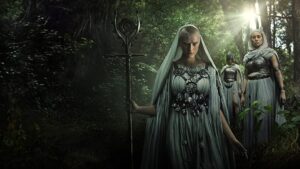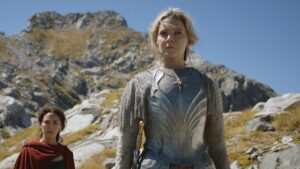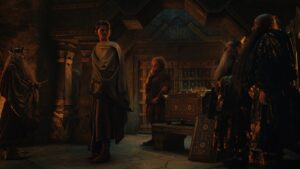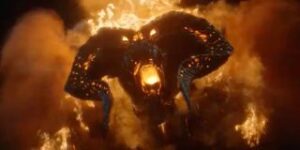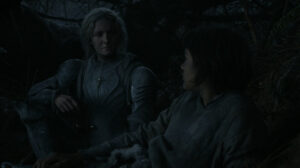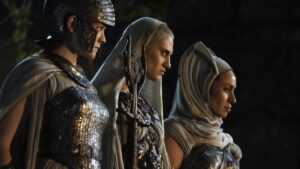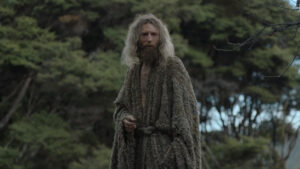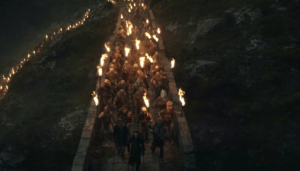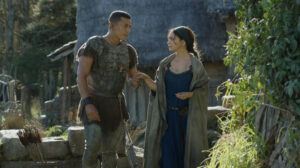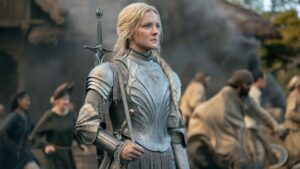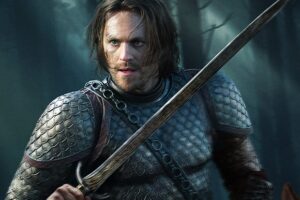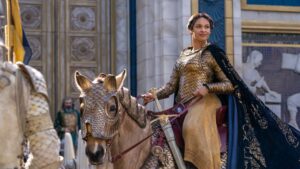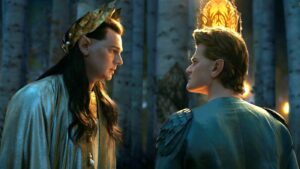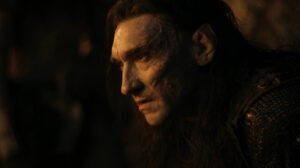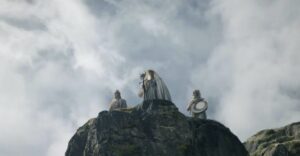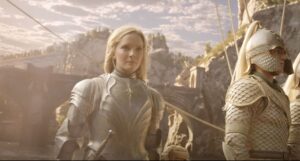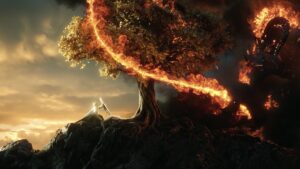MAJOR SPOILERS FOR THE RINGS OF POWER EPISODE EIGHT AHEAD!
“‘In place of the Dark Lord you will set up a Queen. And I shall not be dark, but beautiful and terrible as the Morning and the Night! Fair as the Sea and the Sun and the Snow upon the Mountain! Dreadful as the Storm and the Lightning! Stronger than the foundations of the earth. All shall love me and despair!'”
– The Lord Of The Rings: The Fellowship Of The Ring, The Mirror Of Galadriel, p. 366
The iconic passage quoted above is from a pivotal scene in The Lord Of The Rings where Galadriel (Morfydd Clark), hosting the Fellowship of the Ring in her home as honored guests, is freely offered the One Ring by Frodo Baggins. In shock and disbelief at the suggestion, she is forced to confront the Ring’s tempting power for the first time, and even after training for just such a moment for over three-thousand years she can’t resist breaking into a classic evil villain monologue before finally gathering her wits and prevailing. Her success in that moment ensures that she can eventually leave Middle-earth and find peace in the Undying Lands across the Sea.
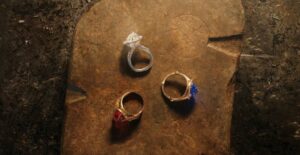
It’s a moment that The Rings Of Power‘s writers have obviously tried to foreshadow in the first season’s final episode, with…moderate success. In a sequence invented for the series, which takes place roughly three-thousand years before the events of The Lord Of The Rings, Galadriel is offered a place at the side of the Dark Lord Sauron and wavers for a minute, torn between her duty to the light and her obsession with the darkness, before rejecting him and his half-baked philosophies so thoroughly that a reunion of their hearts seems inconceivable. It’s supposed to be a moment of catharsis for the protagonist, the moment that her storyline has been leading towards throughout this entire season – and yet it falls flat for two crucial reasons.
Put simply, Galadriel’s epiphany in the finale belongs to a totally different version of the character. I would even wager it was specifically tailored to fit the version of Galadriel who appears in the published Silmarillion and in one of the most frequently-quoted essays in Unfinished Tales – the version widely considered “canonical”, who left Valinor because “she yearned to see the wide unguarded lands [of Middle-earth] and to rule there a realm at her own will”. I myself have long adored the canonical, complex, morally ambiguous version of young Galadriel who seems so at odds with the serene and wise character we meet thousands of years later in The Lord Of The Rings, and there was a time when I had hoped to see her onscreen in The Rings Of Power. But when it became clear that Amazon didn’t have the rights to either The Silmarillion or Unfinished Tales, I resigned myself to the fact that we would probably never get to see a truly ambitious Galadriel in the first season.
And we never did…until the finale, which I have to assume was written very early on, for a version of Galadriel who actually lusts for power, and was never rewritten even after the writers were denied access to the rights they obviously wanted. Maybe they thought it would work as an homage to the canonical version of the character that most fans wanted to see all along, but it doesn’t track with what we learned about the version of Galadriel we actually spent time with in The Rings Of Power; a battle-hardened warrior who has never been shown to crave either power or status in Middle-earth, who scoffs at politicians and seems unaccustomed to dealing with kings and queens, who desires one thing and one thing only: vengeance for her brother’s death. And that, ironically, is the one thing Sauron never offers her when he makes his impassioned plea.
Of course, that’s because Sauron himself is responsible for the death of Finrod (Will Fletcher), and both he and Galadriel know it, but it would have made sense for him to appease her in the moment by promising her vengeance on those ultimately responsible for all the suffering her family has endured – the Valar, Middle-earth’s pantheon of gods. That suggestion may seem bizarre to some, blasphemous to a few, but hear me out: in The Silmarillion, which contains the closest thing to a “canonical” account of Galadriel’s life that Tolkien ever wrote, it is said that Galadriel rebelled against the gods in her youth and refused their pardon after the downfall of Morgoth, hence why she remained in Middle-earth long after the other “chief actors in the rebellion” had died or departed. I think it’s not too much of a stretch to say that her relationship with the gods is complicated; something that Sauron could and arguably should have exploited when he had the chance.
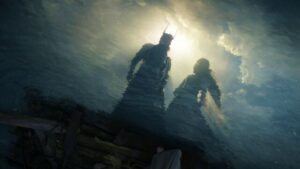
And frankly, what better moment to test the limits of her faith than when she’s face-to-face with the enemy she’s hunted relentlessly for centuries, whom she befriended, grew to trust, and even began to love? It didn’t actually happen that way, so there’s no sense in me veering off on a tangent, but I do wonder why the writers went down the path they did if their stated goal was to humanize Sauron and force the audience to empathize with him against our will. How can we, if all we know of him is that he craves power? We’ve heard it said, once or twice in the show, that Sauron plans to heal Middle-earth’s hurts (an idea fleshed out fully in Tolkien’s letters), but what we see of him tells a very different, and in my opinion far less interesting, story.
The somewhat genericized version of Sauron we’re introduced to in The Rings Of Power‘s season finale wears the ruggedly handsome face of a mortal Southlander, Halbrand (Charlie Vickers), and strangely never sheds that disguise even after revealing his true identity to Galadriel. The showrunners must have their reasons for sticking with Vickers, and if commitment to the role was one of their criteria I can see why he was chosen to continue as Sauron, because you can’t fake the kind of extensive research that Vickers has done for this role, not just into the lore and into Sauron’s backstory, but into Tolkien’s own thoughts on the nature of good and evil, as well as those of his contemporaries and close friends like W.H. Auden.
Unfortunately, someone in the writer’s room either betrayed Vickers or hugely overestimated his improvisational skills, because Sauron is inexcusably underwritten in the finale and little to none of Vickers’ research shines through his stolid performance. On top of that, the hairstyling and costuming departments failed miserably when constructing his look – between his dirty, uneven reddish-brown wig and the plain garments he wore throughout the season, every styling choice that befitted the persona of Halbrand feels out-of-character for Sauron in retrospect, and the fact that he willingly keeps this form even after parting ways with Galadriel warrants an explanation in and of itself (some of that is probably my headcanons speaking, but I really am bewildered by a number of styling choices made on this show).
But whether in spite of his scruffy appearance or in part because of it, Charlie Vickers exudes sexuality – and the unconsummated tension between him and Galadriel, which can be variously interpreted as sexual, romantic, or entirely platonic, doesn’t entirely dissipate even after he’s revealed as Sauron. Yet I could wish, were it of any avail, that Galadriel had not been so quick to reject him – her haste to assert her moral superiority over the charismatic Dark Lord seems to be for the audience’s benefit rather than her own, echoing moments in dozens of other books, films, and series’ where pure-hearted heroines have spurned their villainous love-interests, with Alina in Shadow And Bone and Rey in The Last Jedi coming to mind immediately. I’m not the best person to examine why women’s wrongs are vilified by writers while men’s are romanticized, but I would very much like to see this trope subverted someday and The Rings Of Power has already failed in that respect.
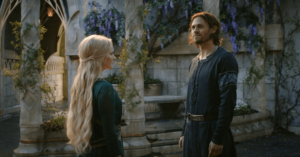
If the show’s version of Galadriel was even half as politically ambitious as her counterpart in the books, she would have rejected Sauron’s offer not because it was the “right” thing to do but because it would mean sharing power with someone else. And all I have left to say on the subject is that it would have made for a far more compelling scene than the one we got, which is unsurprisingly sexy and well-shot (props to director Wayne Che Yip) but also…unsurprising. When a master manipulator like Sauron is on the game-board at last, you’d think that there would be some twists and turns in store but the finale instead takes the most direct path to its destination, leaving me to once again wonder whether showrunners J.D. Payne and Patrick McKay should maybe leave the writing to others.
The highlight of this mostly average episode, for me, is the scene where Halbrand introduces himself to Celebrimbor (Charles Edwards), the Elven jewel-smith with whom he will go on to forge the first Rings of Power…in the span of about fifteen to twenty minutes. Though the writing is nowhere clumsier than when Halbrand explains the concept of alloys to Celebrimbor, Edwards’ performance is nowhere more lively than when he’s shyly blushing at Halbrand’s compliments, or when his fingertips and Halbrand’s brush against each other for a moment as they exchange a piece of mithril silver. Many fans felt dissatisfied by the lack of interactions between these two characters and criticized The Rings Of Power for blatant queer erasure as a result, but I wouldn’t be so sure that in season two, with Galadriel no longer susceptible to manipulation, Sauron won’t turn all his attention on Celebrimbor.
And just to be clear, I too would have liked to see the queer undertones in Sauron and Celebrimbor’s story brought to the surface when they were first onscreen together, but nowhere near as much as I wanted Elanor Brandyfoot (Markella Kavenagh) and Poppy Proudfellow (Megan Richards) to kiss in the final minutes of the episode, as Elanor set off on a new adventure into the unexplored east of Middle-earth while Poppy led the nomadic Harfoots in the opposite direction. I knew then that their story wouldn’t parallel Frodo and Sam’s, or even Merry and Pippin’s, but for a few moments, I actually wondered if they might just be our queer parallels to Sam and Rosie – and when Poppy screamed “Wait!” my heart soared, only to drop again when I realized they were just going to hug and cry before saying goodbye. I wish I could say I have no problem with theirs being a sweet platonic relationship, but in a story as vast and sprawling as this one, to have no queer characters at all is…suspicious, not gonna lie.
In season two, it seems that Elanor’s screentime will once again primarily be shared with The Stranger (Daniel Weyman), now revealed to be one of the five Istari or “wizards” sent to Middle-earth to combat Sauron between the Second and Third Ages. Which one, exactly, remains a mystery; but of the five, only two are ever said to have journeyed east into the lands of Rhûn, where the Stranger is currently headed – and those two are, conveniently, the enigmatic Blue Wizards whom Tolkien wrote the least about in his lifetime, which could make them particularly appealing to writers looking to expand on the legendarium. Alternatively, he’s just Gandalf, but surely that or one of his many other names would have been used in the episode if that were the case, no?
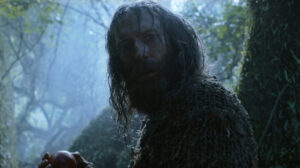
Either way, the Mystics from Rhûn somehow recognized him as an Istar immediately after discovering the full extent of his power, but they’re dead now (much too soon, if you ask me), and the Stranger hopes that in Rhûn he can learn whatever it was they knew. But he already knows the most important thing: that he is good, and not because of what he was told but because of what he chose to be. I can imagine the eye-rolls that will have induced from some, and yes, it’s clearly intended to be heartwarming, but aren’t all stories involving Hobbits, to some extent? Isn’t that what we love about them, that they always voice their true emotions without reservation even at risk of sounding overly earnest? And isn’t it beautiful that the Stranger, who didn’t speak at all when he first descended from the sky, is learning to speak what he truly means and feels from the best teachers in Middle-earth?
Of all the characters crammed into The Rings Of Power‘s first season, I dreaded the Harfoots the most, largely out of fear that they would slow down the story – and yet in the end, theirs was the only subplot that consistently moved slowly enough for my tastes. While the Rings of Power themselves were forged in a matter of minutes by characters who’ve had barely any screentime throughout the season, abruptly resolving a story that had only just gotten started, the Harfoots required eight whole episodes to build up to their own extremely satisfying cathartic moment in the finale; the moment where they band together to defeat the Mystics, pelting the ethereal antagonists with small stones – possibly alluding to how Bilbo defeated the ravenous spiders of Mirkwood (which is incidentally also where this scene takes place, although in the Second Age it’s still known as Greenwood the Great).
So yeah…definitely didn’t go into this expecting to want more non-canonical Harfoots and less of Sauron the literal Dark Lord, but I have a feeling Tolkien at least would be pleased to know that the light can be more interesting than the darkness, and sometimes all it takes is someone like an Elanor Brandyfoot or a Poppy Proudfellow, the most quintessentially Tolkienesque characters to have never flowed from the author’s pen.
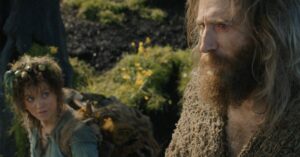
If The Rings Of Power can’t yet commit to telling the darker stories of the Second Age with the nuance they deserve (I’m still not sure where and when exactly the writers lost the thematic through-line of mortality and the fear of death, but by the time they find it the story of Númenor’s downfall will be over at the rate we’re currently speeding through major plot-points), at least it doesn’t lack for wholeheartedly magical subplots that make this first season worthwhile despite a disappointing (and to be fair, only temporary) conclusion to Galadriel and Sauron’s intertwined character arcs.
Episode Rating: 7.5/10
